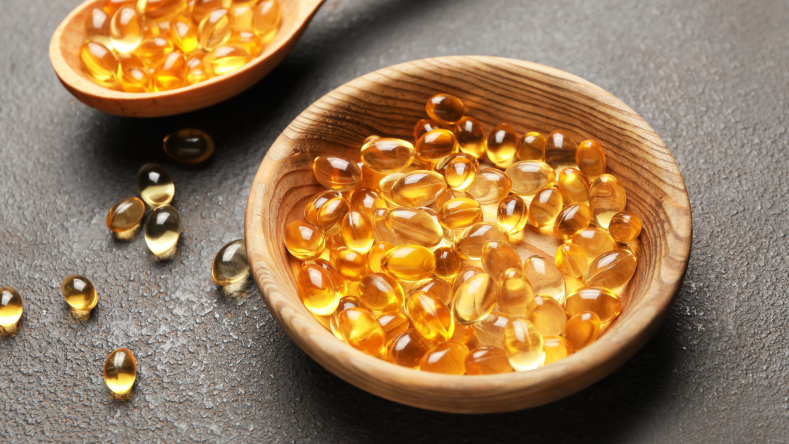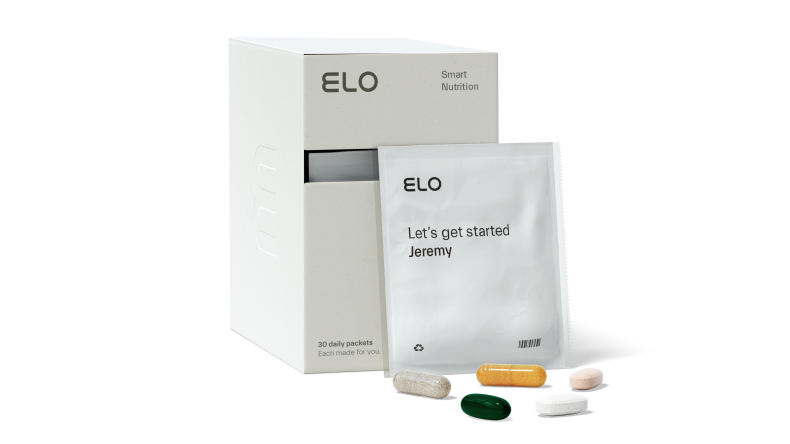Everything you need to know about fish oil supplementation
Fish oil is one of the most commonly used dietary supplements in the U.S. But does it have real benefits, and is it worth the hype? Here’s everything you need to know about fish oil supplementation and whether you should consider adding one to your supplement routine.

Contents
What is fish oil? Fish oil benefits How much fish oil should you take each day? Is there a difference between fish oil and omega-3 supplements? Best fish oil supplement Fish oil precautions Side effects of fish oil supplements Is fish oil safe? What is a good fish oil alternative? FAQs on fish oil & omega-3s Summary Key takeawaysAfter vitamin and mineral supplements, fish oil is one of the most commonly used dietary supplements by adults and children in the U.S. [ 1
From lower triglycerides and depression relief to anti-inflammatory benefits, here’s everything you need to know about fish oil and why you may want to include it in your supplement regimen.
What is fish oil?
Fish oil is a dietary source of omega-3 fatty acids and is extracted from the tissues of fatty or oily fish (like herring, tuna, anchovies, and mackerel) or the livers of other fish, such as cod. These omega-3s are essential for blood clotting, hormone production, smooth muscle contraction, inflammation, immune response, and more [ 1
Fish oil contains two important omega-3s unique to fish and seafood known as eicosapentaenoic acid (EPA) and docosahexaenoic acid (DHA) [ 1
DHA plays a crucial role in developing eye and nerve tissues and may also reduce the risk of heart and circulatory disease [ 2 3

Fish oil benefits
The health benefits of fish oil supplements —and the important DHA and EPA omega-3s they contain— have been the focus of much scientific research. Here are the key science-backed benefits of fish oil supplements to date.
Lower triglycerides
Significant evidence shows that the omega-3 fatty acids in fish oil can cause a potent reduction in triglyceride 4 5 HDL cholesterol LDL cholesterol 5 6
Fish oil reduces triglyceride levels by reducing the amount of triglyceride-rich particles (also known as VLDL) produced by the liver. It also boosts the rate at which VLDL is removed from the blood after a meal [ 4
For managing high triglycerides in the 200-499 mg/dL range, experts state that prescription-strength omega-3 fatty acids of up to 4g/day, either with just EPA or EPA + DHA, can potentially reduce triglycerides by 20% to 30% without any increase in LDL cholesterol [ 7
Lower blood pressure
Numerous studies show modest reductions in blood pressure among people who take fish oil supplements [ 4 5
Fish oil may reduce blood pressure by increasing nitric oxide availability (which may enhance oxygen and nutrient delivery to active muscles) and relaxing smooth muscles [ 4
While fish oil may help lower triglycerides and blood pressure, the long-term benefit of fish oil for heart health is less clear. Some evidence suggests fish oil supplements may support long-term heart health, particularly in individuals with low omega-3 intake, while other studies show they do not reduce the rate of future cardiovascular events [ 4 8
If you have high triglycerides or blood pressure, Elo can provide specialized supplements (some of which may include fish oil) that can help improve your levels, as well as offer
personalized nutrition coaching
to help you achieve your unique health goals.
Here’s how Elo can help you feel your best
Improved depression symptoms
Fish oil appears to produce notable improvement in mood among people with depression [ 4
EPA seems particularly effective for reducing symptoms of depression in some people. Studies show dosages of 1 g/day of pure EPA or fish oil containing at least 60% EPA produce the most significant benefits and may work best when used along with antidepressant medications [ 3 4
Other research suggests fish oil may also ease symptoms of bipolar disorder (also known as manic depression), particularly in people whose depression is severe [ 4
Reduced symptoms of some inflammatory conditions
The DHA in fish oil has potent anti-inflammatory properties that may be beneficial for certain inflammatory conditions.
Studies suggest fish oil supplements may reduce pain, ease joint tenderness and improve morning stiffness in people with rheumatoid arthritis. Though the benefits are often modest, fish oil may reduce the need for anti-inflammatory medications [ 5
The anti-inflammatory benefits of fish oil also seem to reduce the symptoms of the most common type of lupus, an autoimmune disease [ 4 9
ADHD symptom improvements
Children and teens with attention-deficit hyperactivity disorder (ADHD) commonly have lower levels of omega-3s. As such, it’s suggested that omega-3 supplements, including fish oil, can improve attention and other symptoms in kids with this disorder. [ 10
Studies have found that fish oil supplementation with a high EPA content (500-750 mg EPA/day) may be effective in reducing symptoms in children with clinically diagnosed ADHD as well as children with only some ADHD symptoms [ 4 4
While these benefits are impressive, fish oil supplements may prove beneficial for other health conditions as well, such as inflammatory bowel disease, childhood asthma and allergies, cystic fibrosis, age-related macular degeneration, and Alzheimer’s [ 1
How much fish oil should you take each day?
The daily recommendation for all omega-3s is 1,600 mg/day for men and 1,100 mg/day for women [ 1
A typical fish oil supplement provides about 1,000 mg of fish oil with 180 mg EPA and 120 mg DHA; however, formulations and doses vary widely [ 1 12 4
There are no established upper limits for any omega-3s, but long-term consumption of EPA and DHA supplements at combined doses of approximately 5 g/day appears safe [ 1
If you’re confused about how much fish oil or the amount of EPA and DHA you should take, there’s no need to worry. At Elo Health, we take the guesswork out of the equation by using science to recommend the right nutrition and supplements for you.
Learn more about Elo’s personalized supplements and 1:1 dietitian support here
.
Can I take fish oil while pregnant or breastfeeding?
Yes, you can take fish oil while pregnant or breastfeeding, as some research suggests it may be beneficial for pregnancy and child development.
Current omega-3 recommendations for pregnant and lactating women are as follows [ 1
1,400 mg/day of omega-3s for pregnant women
1,300 mg/day of omega-3s for lactating women
>
200-300 mg/day of DHA for pregnant and lactating women
How to take fish oil
You can take fish oil at any time of day, with or without food. However, taking fish oil supplements with food (particularly a source of dietary fat) can increase absorption and reduce certain side effects, including “fish burps,” bad breath, and digestive upset.
Is there a difference between fish oil and omega-3 supplements?
There is a difference between fish oil and omega-3 supplements. All fish oil supplements provide omega-3s, but not all omega-3 supplements are made from fish oil.
Omega-3 supplements can also be made from plant sources, including algae and flaxseed; however, these plant-based supplements have a different omega-3 composition from fish oil. Most fish oil supplements contain fairly balanced amounts of EPA and DHA, whereas algal oil contains a significantly greater percentage of DHA than EPA [ 1
Best fish oil supplement
You can find a multitude of fish oil supplements on the market, but not all supplements are created equal.
Unlike food, supplement regulation is largely in the hands of manufacturers, and FDA approval for supplements is only required when the product contains a new ingredient. Therefore, the best fish oil supplement has been third-party tested
Other things to consider when choosing the best fish oil supplement include:
Potency: Getting enough omega-3s, specifically DHA and EPA, is crucial to achieving any potential benefits.
Form of omega-3s: Some forms of omega-3s are better absorbed than others. For example, triglycerides, re-esterified triglycerides, free fatty acids, and phospholipids are better absorbed than ethyl esters; however, all seem to be effective at raising levels of EPA and DHA in the blood [
11
].Freshness: Omega-3 fatty acids are prone to oxidation and can easily turn rancid. To prevent this, look for a supplement that contains vitamin E (a natural antioxidant).
Fish oil precautions
While many people tolerate fish oil with no problem, here are some contraindications you should be aware of before starting fish oil supplements. [ 5
Reduced blood clotting with anticoagulant and antiplatelet drugs, herbs, and supplements. These types of drugs, herbs, and supplements reduce blood clotting. It's possible that taking fish oil supplements with them might increase the risk of bleeding.
Low blood pressure with blood pressure medicines, herbs, and supplements. Taking fish oil supplements can cause a modest decrease in blood pressure. Taking fish oil with blood pressure medications might increase these effects on blood pressure.
Reduced triglyceride benefits with contraceptive drugs. Some contraceptive drugs might interfere with the triglyceride-lowering effects of fish oil.
Reduced absorption with some weight loss medications. Medications including Orlistat, Xenical, or Alli might decrease the absorption of fish oil fatty acids. To minimize this interaction, consider taking fish oil two hours before or after these medications.
Lower vitamin E. Taking fish oil can reduce vitamin E levels.
Fish allergy. While the risk of allergic reactions to fish oils is very low in people that are allergic to fish (due to the purification and processing involved), talk with your physician or allergist before consuming fish oil supplements.
Before adding a new supplement to your routine, it’s recommended to talk with your healthcare provider to make sure it’s the right fit for you.
Side effects of fish oil supplements
Fish oil supplements can cause mild side effects, including:
A fishy aftertaste or “fish burps”
Bad breath
Heartburn
Nausea or diarrhea
Rash
Here are some ways to minimize your chances of experiencing side effects.
Start with a low dose. For example, ~1,000 mg fish oil with 300 mg combined EPA + DHA. If well tolerated, gradually increase the amount as recommended for the desired outcome.
Take your fish oil supplements with food.
Divide your daily dose into 2-3 smaller amounts throughout the day.
Make sure your fish oil supplements have not expired or turned rancid.
Store fish oil supplements in a cool, dry place (preferably in the refrigerator).
Is fish oil safe?
When taken as recommended, fish oil supplements are generally safe and do not contain mercury, a toxic heavy metal that can be a concern with certain types of fish [ 1
Can you overdose on fish oil?
Yes, you can have too much fish oil. While many people tolerate it well, getting too much can increase your risk of bleeding, or stroke, or dampen your immune response [ 5
Research shows doses >900 mg/day of EPA and >600 mg/day of DHA for several weeks can reduce immune function due to suppression of inflammatory responses [ 1 1

What is a good fish oil alternative?
Foods high in DHA and EPA omega-3 fats, like salmon, sardines, mackerel, and herring are the best alternatives to fish oil. Krill oil, cod liver oil, and products that contain algal oil can also be good alternatives to fish oil supplements.
If you’re looking for a great vegan alternative to fish oil, Iwi
FAQs on fish oil & omega-3s
Summary
Fish oil is a type of omega-3 supplement extracted from the tissues of fatty or oily fish or the livers of other fish, such as cod. The health benefits of fish oil supplements are attributed to the DHA and EPA omega-3s they contain. Fish oil supplements can help you get enough of these important omega-3s if you don’t consume 1-2 servings of fish each week.
Research shows fish oil supplementation can have beneficial effects on triglycerides, blood pressure, some types of depression, certain inflammatory conditions, and ADHD. Healthy adults with low fish intake may benefit from taking a fish oil supplement, as well as pregnant and breastfeeding women and individuals with heart disease may also benefit from fish oil supplements.
While fish oil supplements are safe for most people, they may not be appropriate for everyone. Check with your doctor or dietitian before adding fish oil to your supplement regimen.
Disclaimer: The text, images, videos, and other media on this page are provided for informational purposes only and are not intended to treat, diagnose or replace personalized medical care.
Key takeaways
Fish oil is a type of omega-3 supplement made from fatty or oily fish and contains two important omega-3 fatty acids called DHA and EPA.
Fish oil supplements can help lower triglyceride levels and blood pressure reduce the symptoms of severe depression, bipolar disorder, and some painful inflammatory conditions, including rheumatoid arthritis and Lupus.
Healthy adults with low fish intake, pregnant and breastfeeding women, and individuals with heart disease may benefit from taking fish oil supplements.
While fish oil supplements are safe for most people, they may not be appropriate for everyone. Check with your doctor or dietitian before adding fish oil to your supplement regimen.
References
Office of Dietary Supplements - Omega-3 Fatty Acids. (2022, July 28).
https://ods.od.nih.gov/factsheets/Omega3FattyAcids-HealthProfessional/
DOCOSAHEXAENOIC ACID (DHA): Overview, Uses, Side Effects, Precautions, Interactions, Dosing and Reviews. (n.d.).
https://www.webmd.com/vitamins/ai/ingredientmono-864/docosahexaenoic-acid-dha
EICOSAPENTAENOIC ACID (EPA): Overview, Uses, Side Effects, Precautions, Interactions, Dosing and Reviews. (n.d.).
https://www.webmd.com/vitamins/ai/ingredientmono-994/eicosapentaenoic-acid-epa
Lopez, G., MA & Examine.com. (2022, September 28). Fish Oil. Examine.
https://examine.com/supplements/fish-oil/
Fish oil. (2020, December 8). Mayo Clinic.
https://www.mayoclinic.org/drugs-supplements-fish-oil/art-20364810
Wei, M. Y., & Jacobson, T. A. (2011). Effects of eicosapentaenoic acid versus docosahexaenoic acid on serum lipids: a systematic review and meta-analysis. Current atherosclerosis reports, 13(6), 474–483.
https://doi.org/10.1007/s11883-011-0210-3
O’Riordan, M. (2021, May 14). New AHA Guidance on Omega-3 Fatty Acids for High Triglycerides. TCTMD.com.
https://www.tctmd.com/news/new-aha-guidance-omega-3-fatty-acids-high-triglycerides
Aung, T., Halsey, J., Kromhout, D., Gerstein, H. C., Marchioli, R., Tavazzi, L., Geleijnse, J. M., Rauch, B., Ness, A., Galan, P., Chew, E. Y., Bosch, J., Collins, R., Lewington, S., Armitage, J., Clarke, R., & Omega-3 Treatment Trialists’ Collaboration (2018). Associations of Omega-3 Fatty Acid Supplement Use With Cardiovascular Disease Risks: Meta-analysis of 10 Trials Involving 77 917 Individuals. JAMA cardiology, 3(3), 225–234.
https://doi.org/10.1001/jamacardio.2017.5205
Systemic lupuserythematosus (SLE). (2022, July 5). Centers for Disease Control and Prevention.
https://www.cdc.gov/lupus/facts/detailed.html
Can Fish Oil Help Childhood ADHD? (2022, June 7). WebMD.
https://www.webmd.com/add-adhd/childhood-adhd/fish-oil-help-childhood-adhd
Dyerberg, J., Madsen, P., Møller, J. M., Aardestrup, I., & Schmidt, E. B. (2010). Bioavailability of marine n-3 fatty acid formulations. Prostaglandins, leukotrienes, and essential fatty acids, 83(3), 137–141.
https://doi.org/10.1016/j.plefa.2010.06.007
Daily Omega-3s Recommended for Heart. (2009, August 3). WebMD.
https://www.webmd.com/heart/news/20090803/daily-omega-3s-recommended-heart







